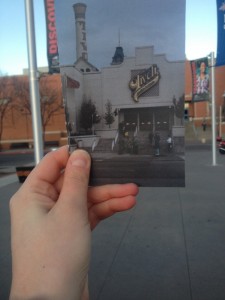 On March 1st of this year, over 150 educators gathered for Teacher Librarian Day at SpringHill Suites Downtown at Metropolitan State University.
On March 1st of this year, over 150 educators gathered for Teacher Librarian Day at SpringHill Suites Downtown at Metropolitan State University.
SpringHill Suites at Metro State, this year’s venue, was a huge hit with attendees. SpringHill Suites is one of the newest additions to Auraria Campus. It was opened in 2012 as a part of MSU Denver’s Hospitality, Tourism, and Events department. Guests had a beautiful view of downtown Denver, and one attendee even called the new location “Exceptional!”
This year’s theme was Common Ground. We kept the TED-style format that has been so popular for the last three TLD events, and presenters were asked to focus their talks on the seamless integration of the new Common Core State Standards (CCSS) with primary sources and technology. According to Patricia Holloway, a librarian at Grandview High School in Aurora, CO, the common threads between the presentations were, “All related to primary sources, and how we weave it all together. We have to keep bringing it back to where we are.”
 The speakers this year, as in years past, stepped up magnificently. The diverse group of educators, historians, gave talks on topics ranging from CCSS, inquiry learning, the importance of place, to teaching students to question, to integrating the iPad into lesson plans.
The speakers this year, as in years past, stepped up magnificently. The diverse group of educators, historians, gave talks on topics ranging from CCSS, inquiry learning, the importance of place, to teaching students to question, to integrating the iPad into lesson plans.
Our educators raved about StevanKalmon’s talk, “Learning to Question”. He focused his discussion on techniques from the Right Question Institute, which encourage students to learn how to ask good questions, and become more engaged in learning. One attendee told us she would begin using the technique right away, and that she had “already started emailing teachers about it”. Stevan has spoken at TLD a number of times, and is always popular among our guests. We were thrilled to have him return.
TPS intern Todd Wolfe teamed up with Dr. Matt Makley, history professor at MSU-Denver, Native American history scholar and author of Cave Rock: Climbers, Courts and a Washoe Indian Sacred Site. They presented on the idea of place as primary source, which encourages teachers to take their students outside of the classroom and to physical locations that are, themselves, primary sources. Matt spoke about taking his students to Canyon de Chelly in northeast Arizona and the power of identifying changes in the landscape over time. From these trips, Todd and Matt developed a lesson plan idea that requires students to obtain primary source photographs of a physical location from the Library of Congress and to return to the site to photograph it in the modern setting, thereby documenting the changes that occurred at the site over time.
 The two demonstrated the technique with examples from their own classrooms. Because the featured photos were of familiar local sites, Matt and Todd both reported that students were able to understand the importance of change as it relates to location. Attendees came out in droves on Twitter and in the end-of-day surveys to rave about Todd and Matt’s discussion of rephotography.
The two demonstrated the technique with examples from their own classrooms. Because the featured photos were of familiar local sites, Matt and Todd both reported that students were able to understand the importance of change as it relates to location. Attendees came out in droves on Twitter and in the end-of-day surveys to rave about Todd and Matt’s discussion of rephotography.
Though social studies have always been emphasized at Teacher Librarian Days, other disciplines were also represented. Dr. Robert Hazan, Dr. Pamela Troyer and Cheryl Upshaw each presented on ideas for using primary sources in all types of classrooms.
Dr. Hazan, Chair of MSU Denver’s Political Science department, was another popular addition to the day. His presentation, “From Non-Sense to Common-Sense: In Pursuit of Common Ground in Civility and Decency” addressed the value of primary sources in the worldwide journey to peaceful coexistence.
Dr. Troyer worked with Cheryl Upshaw, TPS intern, to discuss “sprezzatura”, an Elizabethan concept that involves becoming excellent in a variety of disciplines. They showed that to become excellent writers, Elizabethan sonneteers used ancient Greek literary forms in their poetry. They then showed how this practice is still used in the modern day, in the work of Natasha Trethewey, current Poet Laureate of the United States.
 Marilyn Cullen-Reavill, from the Department of Teacher Education at MSU Denver, took time to address the ways in which educators can create common goals to address Common Core in the classroom. She also addressed the ways in which is this is being done with pre-service teachers in MSU Denver’s Education program.
Marilyn Cullen-Reavill, from the Department of Teacher Education at MSU Denver, took time to address the ways in which educators can create common goals to address Common Core in the classroom. She also addressed the ways in which is this is being done with pre-service teachers in MSU Denver’s Education program.
Between sessions, Michelle Pearson and Laura Isrealsenled audience participation by asking questions focused on student inquiry, classroom application, and higher level thinking. Audience members then posted their responses to Twitter using the hashtag #TLD2013. Some of their responses included:
#TLD2013 Rephotography is very exciting! I have already thought of a lesson in which to incorporate it.
— Michele (@AVsFanMichele) March 1, 2013
#tld2013 Using Meograph to present research findings from a re-photography activity would be a great way to integrate multiple tools
— Mary Jackson (@MaryJackson25) March 1, 2013
So proud of my D20 colleagues, Terri,Christine Schein, and Gina for their wonderful afternoon presentations at #tld2013
— Toni Olivieri-Barton (@toniobarton) March 1, 2013
We were flattered by how much positive feedback we received, and that attendees were so open with their suggestions. This year, presentations such as Dr. Chris Jennings’ iPad-centered “Primary Sources in Future Tense” and Laura Isrealsen’s, “Meograph: Using Primary Sources to Tell a 4-Dimensional Story” were balanced with strong pedagogical applications such as Dr. Stephanie Hartman’s(Colorado Department of Education) talk, “Finding a Common Ground”, which explained that the Common Core State Standards have been embedded in the Colorado Academic Standards (CAS). She states, “If you are teaching to Colorado Standards, you are teaching to Common Core State Standards.” She then tells the audience that Colorado Social Studies standards are focused more on concepts and skills, rather than on content – and to combat the confusion involved with this, her team put together a database of curriculum samples. They developed 670 of these samples, in 10 content areas. This project provided a base for Colorado school districts – a common ground from which teachers and districts could build curricula that fit their individual needs, while still conforming to CAS. You can take a look at the samples here.
 For each session, we had a “Common Thread” presentation by a classroom teacher, used to tie the presentations together with short discussions and bring the focus back to CCSS. These short Common Thread talks focused on practical application of the Common Core State Standards in the classroom. They included: Mel Johnson’s “Common Stories, Extraordinary Results”, Laura Israelsen’s “Meograph: Using Primary Sources to tell a 4-Dimensional Story”, Gina Schaarschmidt’s “Zebulon Pike and the Worst Birthday Ever”, and Terri Inloes’ “Guts, Gore and Blood-letting: How to Encourage Kids to Read, Research and Risk!”. These presentations were extremely popular with attendees, who loved that the four Common Thread presenters showed how to use CCSS in the classroom, using specific examples.
For each session, we had a “Common Thread” presentation by a classroom teacher, used to tie the presentations together with short discussions and bring the focus back to CCSS. These short Common Thread talks focused on practical application of the Common Core State Standards in the classroom. They included: Mel Johnson’s “Common Stories, Extraordinary Results”, Laura Israelsen’s “Meograph: Using Primary Sources to tell a 4-Dimensional Story”, Gina Schaarschmidt’s “Zebulon Pike and the Worst Birthday Ever”, and Terri Inloes’ “Guts, Gore and Blood-letting: How to Encourage Kids to Read, Research and Risk!”. These presentations were extremely popular with attendees, who loved that the four Common Thread presenters showed how to use CCSS in the classroom, using specific examples.
We were excited to find that a number of teachers and librarians are regular TLD attendees. There were even a few guests who had come to TLD every year! Throughout the day, several newcomers also expressed their enthusiasm about the event. As we put together events like this one, it’s encouraging to find that our work has been appreciated for so long, and that our efforts continue to be successful.
Dr. Peggy O’Neill-Jones, Director of Teaching with Primary Sources, Colorado, loves how Teacher Librarian Day continues to grow and improve. “I think TLD just keeps getting better and better. I think this year exemplified that. Out of the seven years we’ve done this, we’ve continued listening to teachers, and they keep telling us what they want. This year we were able to demonstrate the strong connection between Library of Congress primary sources and Common Core State Standards. They are a perfect fit.”




